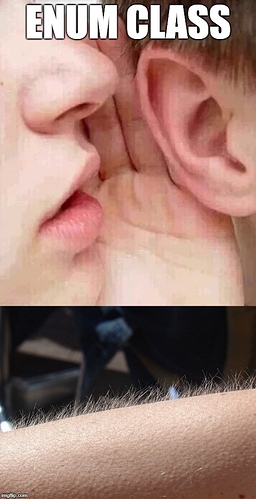I just need to create some sort of tracker so other people can use it 
There’s 27 samples and 50 patterns in that one, here’s a look at the track array…
const char my_pattern[]={0,1,2,3,4,5,6,7,8,9,10,11,12,13,14,15,16,17,18,19,20,21,22,23,24,25,26,27,28,29,30,31,32,33,34,35,36,37,38,39,40,41,42,43,44,45,46,47,45,46,48,49};
const uint8_t tune[50][64][4][5]={
{
// Pattern:0
// .----------------------[Note] Upper nibble is the note value.
// |.---------------------[Octave] Lower nibble is the octave.
// || .-----------------[Volume + 128] If first bit is set then volume is used.
// || | .------------[Instrument] Can use up to 255 instruments I suppose.
// || | | .-------[Effect] Effects are based on standard MOD effects.
// || | | | .--[Effect Value] Values for above effects.
// || | | | |
{{0x15,0xC0,0x02,0x0C,0x01},{0x00,0x00,0x00,0x0F,0x03},{0x00,0x00,0x00,0x0C,0x00},{0x00,0x00,0x00,0x0C,0x00}},
{{0x00,0x00,0x00,0x0C,0x02},{0x00,0x00,0x00,0x0C,0x00},{0x00,0x00,0x00,0x00,0x00},{0x00,0x00,0x00,0x00,0x00}},
{{0x00,0x00,0x00,0x0C,0x03},{0x00,0x00,0x00,0x00,0x00},{0x00,0x00,0x00,0x00,0x00},{0x00,0x00,0x00,0x00,0x00}},
{{0x00,0x00,0x00,0x0C,0x04},{0x00,0x00,0x00,0x00,0x00},{0x00,0x00,0x00,0x00,0x00},{0x00,0x00,0x00,0x00,0x00}},
{{0x15,0xC0,0x03,0x0C,0x05},{0x00,0x00,0x00,0x00,0x00},{0x00,0x00,0x00,0x00,0x00},{0x00,0x00,0x00,0x00,0x00}},
{{0x00,0x00,0x00,0x0C,0x06},{0x00,0x00,0x00,0x00,0x00},{0x00,0x00,0x00,0x00,0x00},{0x00,0x00,0x00,0x00,0x00}},
{{0x00,0x00,0x00,0x0C,0x07},{0x00,0x00,0x00,0x00,0x00},{0x00,0x00,0x00,0x00,0x00},{0x00,0x00,0x00,0x00,0x00}},
{{0x00,0x00,0x00,0x0C,0x08},{0x00,0x00,0x00,0x00,0x00},{0x00,0x00,0x00,0x00,0x00},{0x00,0x00,0x00,0x00,0x00}},
{{0x15,0xC0,0x04,0x0C,0x09},{0x00,0x00,0x00,0x00,0x00},{0x00,0x00,0x00,0x00,0x00},{0x00,0x00,0x00,0x00,0x00}},
{{0x00,0x00,0x00,0x0C,0x0A},{0x00,0x00,0x00,0x00,0x00},{0x00,0x00,0x00,0x00,0x00},{0x00,0x00,0x00,0x00,0x00}},
// etc.
I think if I limit the number of samples to 15, I can probably merge the instrument and effect bytes and save a little more space…
 Amazing that there is such a long soundtrack in ROM!
Amazing that there is such a long soundtrack in ROM!
